Visionary Social Reformers.
This page is about social reformers who I believe were prophetic. They had a clear vision of what was on God's heart. Not just that but they worked in a practical way to bring the vision to reality.
Visionary Social reformers Video
William Booth.
His Prophetic Annointing

William Booth

Crest of The Salvation Army

“In Darkest England and the Way out” by William Booth.

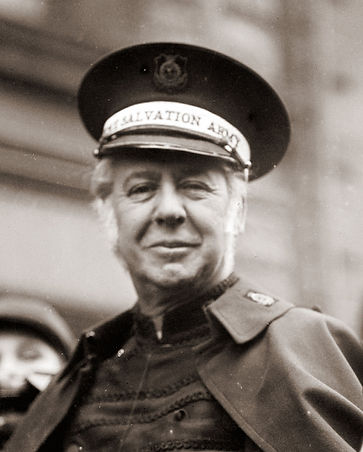
Bramwell Booth
William Booth Video
For all my Christian life, since 1986, I have worked with marginalised people; homeless, addicts, people with mental health issues. For eight years I worked for the Salvation Army in their social services centres. I was always struck by the commitment of the Salvation Army officers I met. I liked to hear them tell their stories as some of them had grown up in the Salvation Army. It’s a movement of humble people filled with a desire to serve God. I remember one of the officers telling me that as a child she grew up in a Salvationist family and every year there was a thing called “brown envelope day”. Every officer would receive his or her “marching orders” which would tell them where they had to work. If that meant moving from the south of England to Scotland then the officer would move even if he had to uproot the whole family. That’s commitment!
Anyway I was browsing through a secondhand bookshop in Bristol one time and I came across a book called “In Darkest England and the Way out” by William Booth. Booth wrote this book in 1890 when Britain referred to parts of Africa as “Darkest Africa”. His point was that there was a lot of darkness in England; Terrible poverty, social injustice, exploitation and abuse. He was aware of the huge number of orphans, of homelessness and of deprivation. Things were so bad that people would sell their own children to escape from poverty. The book attempted to quantitatively assess the scale of the problem, provide statistics and look for solutions. In this way it was revolutionary in its approach and caused a sensation when it was published selling 10,000 copies on its first day. In the back of the book was a pull out picture which illustrated Booth’s Vision for the Lost. This is the aspect of William Booth I want to highlight. A prophet who had visions.
William Booth is of course mainly known as the founder of the Salvation Army. He was originally a Methodist minister and evangelist. His heart was always for evangelising the lost and so he eventually became an independent evangelist so that he could concentrate full time on preaching.By 1865, Booth and his wife had opened 'The Christian Revival Society' in the East End of London, which held regular evening meetings to share the gospel of Christian salvation to the the poor and marginalised. The Christian Revival Society was renamed The Christian Mission, subsequently to become the East London Christian Mission.
In 1878 Booth was dictating a letter where he said “we are a volunteer army” his son Bramwell interjected and said "Volunteer, I'm no volunteer, I'm a regular!" From this came the idea of a Salvation Army. However, the purpose of this video is not to give the story of the Salvation Army but to tell of William Booth as a prophet and visionary who had many visions from the Lord.
William Booth had visions of heaven, visions of the future of the nations, visions of the future of the church. He actually produced a book called “Visions” in 1906. Probably his most famous vision was his Vision for the Lost.
He was sitting in a railway carriage looking out of the window in 1865 (I think) when his mind started to wander and he thought of all the huge morass of unsaved people in the world. He later wrote: -
As I looked out of the window, I seemed to see them all . . . millions of people all around me given up to their drink and their pleasure, their dancing and their music, their business and their anxieties, their politics and their troubles, ignorant - willfully ignorant in many cases - and in other instances knowing all about the truth and not caring at all. But all of them, the whole mass of them, sweeping on and up in their blasphemies and devilries to the Throne of God. While my mind was thus engaged, I had a vision.
I have attached a link to the full vision in the description. It was a vision of a dark stormy sea full of the lost who were perishing. Out of the sea rose a rock which represented Christ. Some of the lost were struggling onto the the rock and there were some on the rock helping them out of the sea. However most of the people on the rock, who had themselves been rescued, were simply moving on with their lives and ignoring those still in the sea. Booth was shocked at how many believers ignored the call to rescue the lost
The great thing about William Booth was not just that he had visions but that he acted on them. At the end of his Vision for the Lost he says: -
Now then, go to God and tell Him you are prepared as much as necessary to turn your back upon it all, and that you are willing to spend the rest of your days struggling in the midst of these perishing multitudes, whatever it may cost you.
Another example of William Booth’s determination to make a difference was when his son Bramwell saw homeless people sleeping under London bridges. He told his father about it and his father replied “Go and do something”. This event is seen as a pivotal moment in the development of the Salvation Army which is now the biggest private provider of social services in the world. For me this is the mark of a true prophet. He not only saw visions but he had God’s heart to act upon them. In other words he was obedient.
William Booth. Vision of the Lost PDF
George Williams
The man who caught God's heart
George Williams Video
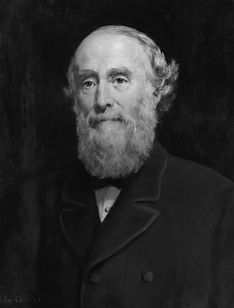
Sir George Williams by John Collier. National Portrait Gallery, Public domain, via Wikimedia Commons

George had to leave his father's farm after he drove the horse and cart into a ditch

Taylors at work in London. Artist unknown. (Courtesy of: Museum of London, 2002-179, Wikimedia Commons).

A plaque erected in honour of George Willaima and the eleven young men who started the YMCA in 1844. It is erected on the site of the draper's establishment where they worked

Merchants' Association Shop Hours Act 1912
This is part of a series I am doing on people who are known as social reformers but who were also visionaries. George Williams is known as the founder of the YMCA (Young Men’s Christian Organisation). He was also a man who caught God’s heart for the young people of his time. We might think of a prophet as someone aloof who declares messages from God. However prophets can also be people who roll up their sleeves and work to bring about the vision God has given them. George Williams was one of these. Everything he worked for was driven by compassion for the plight of the young working men of his time who were treated as commodities to be used and abused by Victorian employers.
He was born in 1821 on a farm near the small town of Dulverton in Somerset. Perhaps this is why I feel a strong connection with him because my family history is from this area and also I currently work for the YMCA. The story goes that as a boy George was driving a cart on his father’s farm and it ran into a ditch and toppled over. His father said to him in frustration that he would never make a farmer and sent him to work as a draper’s apprentice in the nearby town of Bridgewater. While there, in 1837, he became a Christian. Prior to this he described himself as a "careless, thoughtless, godless, swearing young fellow". Now, his life changed in a radical way. In 1841, he went to London and worked as an apprentice at Hitchcock & Rogers, a draper's shop, and became a member of the King's Weigh House Congregational Church, using his time for evangelisation. A wealthy partner in this drapery business was George Hitchcock who was a Christian and who was very influential in George Williams’ life. George would later marry his daughter. Drapery was the business of selling textiles and fabrics and at this time conditions for a draper were miserable which is something that George Hitchcock himself later acknowledged
“The late hours to which labour was usually protracted in retail trades had been an evil of the greatest magnitude. The great majority of shops were rarely closed before eleven or twelve o’clock during the summer months, and ten or twelve in the winter. This evil was carried onto an extreme in Draper’s establishments. George Hitchcock.” Rules of the Metropolitan Drapers’ Association. 1845.
It was in this environment that George Williams met with fellow drapers for bible study and formed the drapers’ Evangelical Association. Three years later in 1844 Williams and eleven other young men from the draper’s establishment formed the Young Men’s Christian Association. This is why I say that he caught God’s heart. He saw the terrible conditions that young men in his own trade were working in and he not only had compassion but he did something about it. At the first annual meeting of the YMCA in 1845 its object was said to be
The improvement of the spiritual and mental condition of the young men engaged in houses of business, by the formation of bible classes, family and social prayer meetings, mutual improvement societies,or any other scriptural agency. First Annual report of the YMCA 1845.
There were other similar movements happening at that time and momentum was building for what became known as the Early Closing Movement. George Williams’ boss, George Hitchcock, said at a meeting in London
I bear my unqualified testimony to the possibility of closing at a much earlier hour, without detriment to employers. Inverness Courier. 8/12/1853.
The Early Closing Movement campaigned for the early closure of shops on Saturdays. Its aim was “to liberate shopworkers for self-improvement”, an early step towards the five-day working we know today. It was not until the passage of the Shops Act 1912 that shop assistants became legally entitled to at least one half-day a week off. As increasing numbers of employers adopted the Saturday “half-holiday” as it became known, a burgeoning leisure industry was quick to capitalise on the movement by offering reduced fares for day-trippers to the countryside on Saturday afternoons. But perhaps the biggest winner was the sport of football, which began to stage matches on Saturday afternoons as the Football Craze took hold in the 1890s. I am just pointing this out to illustrate that much of what people enjoy today has its roots in the Early Closing Movement.
George Williams was concerned about the lack of healthy activities for young men in major cities; the options available were usually taverns and brothels. His heart was to improve their lives and the opportunities available to them. Most of all his heart was to improve their spiritual condition. Many of the benefits enjoyed by working people today are due to the efforts of George Williams and others like him. Today the YMCA is The oldest and largest youth charity in the world, its aim is to support young people to belong, contribute and thrive in their communities.
I believe that he was a simple man who found the Lord and had a vision that was in line with God’s heart. Despite being knighted by Queen Victoria, and being honoured with a stained-glass window in the nave of Westminster Abbey, he remained a humble man who literally changed the world.
Florence Nightingale.
The hard working visionary
.jpg)
Florence Nightingale. Public domain, via Wikimedia Commons

Painting of Nightingale by Augustus Egg, c. 1840s, via Wikimedia Commons

The Mission of Mercy: Florence Nightingale receiving the Wounded at Scutari (Jerry Barrett, 1857). Public domain, via Wikimedia Commons
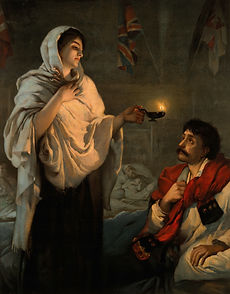
The Lady with the Lamp. Popular lithograph reproduction of a painting of Nightingale by Henrietta Rae, 1891. Public domain, via Wikimedia Commons
Florence Nightingale Video
The nursing profession is something that I have taken for granted all my life. My mother was a nurse in the 1940s when the profession was seen as a “calling” and each shift started with prayers. I became a Christian in the 1980s and felt called into the nursing profession as a psychiatric nurse. Something that I did for thirty three years. At one point I lived in a house that had a blue plaque on it honouring Edith Cavell who had lived there as a schoolgirl. She had been famous as a World War One nurse who was arrested and shot for spying by the Germans. Her deeply Christian beliefs propelled Cavell to help all those who needed it, including both German and Allied soldiers. She was quoted as saying, "I can't stop while there are lives to be saved."
Part of my own testimony as a Christian involves being ill in hospital and seeing nurses at work. Seeing people devoted to caring touched my heart and made me realise what a wasted life I had led. I always felt that the nursing profession was Christian at its heart. Florence Nightingale was the archetypal exponent of this. She felt called by God and literally heard his voice telling her that she had work to do. According to some accounts she heard God's voice four times when she was young, calling her to a specific mission. She claimed to have heard the same words each time: "I have work for you to do". By the time she was 16 years old, it was clear to her that nursing was her calling. She believed it to be her divine purpose. Born into a wealthy family, Florence overcame the narrow opportunities offered to girls of her station. In 1851, despite the disapproval of her family, she completed a course of nursing training in Germany.
At this time there was no real nursing profession in England. What we would now regard as nursing duties were carried out by orderlies with no real training or understanding of sanitation and health care. Florence’s vision was for high quality nursing care based on science, statistics, and good practice. She remained true to this vision all her life. She also seems to have been gifted by God for this task as she had remarkable stamina and was gifted with a peculiar genius: She could assimilate information in prodigious quantities, retain it, marshal her facts, and use them effectively. She was truly, in my opinion, a prophet with a vision. She saw a better future and spent her life working for it. Like the other social reformers in this series she knew what she had to do
After her training in Germany she worked as a superintendent at the Institution for Care of Sick Gentlewomen in Distressed Circumstances in England. While she held this job, cholera broke out and nurses, fearing the disease, refused to serve, so Florence acted as a nurse herself and earned universal respect. This reputation helped her when the Crimean War broke out and the government created a new position for her: “Superintendent of the Female Nursing Establishment of the English General Hospitals in Turkey.” The rest is history. Florence became famous for her work in the Crimea, caring for the sick and wounded of the Crimean war and tirelessly working to improve nursing standards.
She was not entirely approved of by most groups as she was pushing boundaries. Most of her helpers were Anglican or Catholic nuns who could be suspicious of her. The one group who loved her were the patients. They adored the “Lady of the Lamp,” as they called her when she visited the wards at the end of the day. They spoke of “kissing her very shadow” as she passed.
When the war ended she seemed to the public to be the one good thing that emerged from it. She continued her work and it would take volumes to record it all. She was a pioneer in the areas of hospital hygiene, sanitation and also in the use of statistics. In fact one chart she used to illustrate the causes of mortality in the Crimean war, which Nightingale used as a way to explain complex statistics simply, clearly, and persuasively, has become known as Nightingale's "Rose Diagram”.
Although she was not strongly denominational she regarded herself as a co-worker with God and she saw her nursing profession as a direct extension of God's work, believing it was her duty to reflect God's goodness and bring health to the world. She was not a theologian and her religious views weren’t always orthodox but everything she did was motivated by love for her fellow men and women and her desire to improve their conditions. When I was nursing in hospitals and worked with a really excellent female nurse I could always see a bit of Florence Nightingale in her. That incredible ability to gather information, to focus on the job in hand and do it all not just in a professional way but with grace and love.
Robert Baden-Powell.
"Scouting is nothing less than applied Christianity" - (Scouting & Christianity, 1917)
Robert Baden-Powell Video
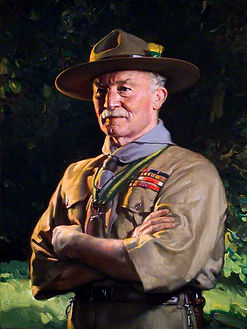
Robert Baden-Powell

Frederick Russell Burnham, Bain News Service, publisher, Public domain, via Wikimedia Commons

Mafeking Cadet Corps, 1899-1900
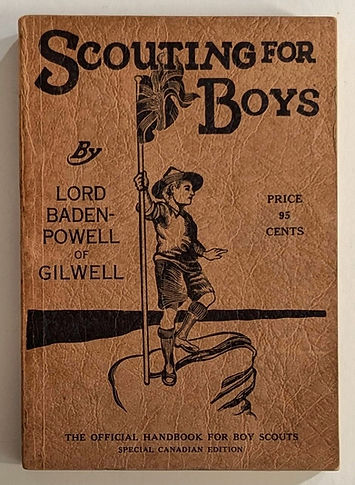
Scouting For Boys
The origins of Robert Baden-Powell’s faith can be traced back to the upbringing that he received within his family. His father was an Anglican priest and professor of geometry at Oxford University. He died when Robert was three years old but Robert inherited his father’s love of the bible. He also had a great love of nature which was fostered by his mother. When she became a widow, she used to take her children on long exploratory walks in the countryside, awaking in them curiosity regarding animals and plants, and guiding them to observe and admire nature.
An excellent student, he won a scholarship to Charterhouse Public School. He enjoyed adventure holidays in his youth with his brothers. They would go yachting and canoeing. His knowledge of scouting was honed during these expeditions. They would camp in the woods near his school, even though this was out of bounds to students, and cook on a campfire. He went on to join the Army in 1876 when he became lieutenant in the 13th Hussars in India. He had an eventful career and in 1896 he found himself fighting in the Second Matabele War In 1899 in the region that we now know of as Zimbabwe. During this period he became recognised as a gifted scout, (what we would today refer to as deep reconnaissance). He owed his growing knowledge in this area to his American friend Frederick Russell Burnham. This man had learnt extensive woodcraft skills from some of the pioneers of the old wild West which he taught to Baden-Powell. It was in Matabeleland that he started to wear Burnham’s Montana style peaked stetson which would later be used by the Boy Scouts. He also carried a staff and wore a scarf both of which later became part of a boy scouts equipment. After the Matabeleland war he was posted to India and it was here that he started teaching scouting to young soldiers in his regiment. He wanted each man to be an efficient reliable “individual” even if he lost his officer. In 1899 he wrote a little book called “Aids to Scouting for NCOs and Men”. It taught observation, tracking and deduction. The book was finalised in Mafeking, Africa, where he was posted later in 1899.
Mafeking was a small railway town which had to be defended from the Boers during the Boer War. It’s worth dwelling on this event because it illustrates the character of the man. Baden-Powell actually seemed to enjoy the siege of Mafeking regarding it as a great adventure. He organised the defense of the town from the besieging Boers and held it for 217 days. Baden-Powell only had between 1,000 and 1,500 men to defend the town against about 8 or 9,000 Boers. Through good organisation and ingenuity he managed to give the appearance of having more men than he actually did and held the town until it was relieved by a relief column. The siege highlights Baden-Powell's great qualities of preparedness and organisation. Qualities that he would later instil into the scouting movement. The siege also involved the use of boys below fighting age carrying out duties such as carrying messages and acting as lookouts. These boys were known as the Mafeking Cadet Corps. Baden-Powell was impressed by the boys and later mentioned them in the opening pages of his 1908 book Scouting for Boys. He also later said that he made the discovery that
“boys, when trusted and relied upon, were just as capable as men and just as reliable” 1957 Boy Scouts Association Documentary Film.
When he eventually returned to England in 1903 he found that his book “Aids to Scouting was being used to train boys. He was asked to rewrite the book specifically for boys rather than soldiers. To test out this idea he got together a group of boys from all walks of society and took them camping on Brownsea Island, Dorset, in 1907. He taught the boys camping, cooking, woodcraft, observation and boatmanship among other things. He also taught them patriotism and chivalry. The boys loved it all and so Baden-Powell wrote the handbook “Scouting for Boys”. The scouting movement took off and in 1910 he resigned from the army to devote all his time to the new movement. It wasn’t long before the girl guides movement started as well.
Some people will be surprised at Robert Baden-Powell being included in this series on Christian social reformers. Many people don’t like him largely because his reputation has been smeared in recent times.
Thomas Packenham (Lord Longford) in his book on the Boer War accused Baden Powell of starving the black African refugee population at Mafeking so that he could feed his men. When Tim Jeale wrote Baden-Powell’s biography he examined the source material for this accusation and found it to be untrue. Everyone at Mafeking had been fed up until Christmas of 1899. After Christmas there were problems escorting the refugees safely out of Mafeking as they were attacked by the Boers. Food kitchens inside Mafeking were organised. All the cavalry reserve horse were slaughtered in order to help feed the refugees so destroying any mobility that that the British force had.
One of the main reasons that people today are trying to cancel Baden-Powell is his supposed links with Fascism. However Baden Powell always rejected socialist eugenics and other fascist creeds. He supported some of the youth movements in Europe in the 1930s as he thought they were empowering to young people. The policy of the Boy Scout movement towards the Hitler Youth was formulated in 1935 and said quite clearly that any contact with the Hitler Youth was undesirable. The following year there was a formal embargo on all activities with the Hitler Youth.
Other accusations have been made against Baden-Powell but the mud never sticks. He was a practical Christian man with a vision for improving the lives of young people.
Baden-Powell had a clear vision for young people. He wanted them to be self reliant, resourceful, and prepared for anything. However, he also wanted them to have good values based on Christian principles. This is why I have included him in this series on social reformers. He saw what was needed and committed his life towards that goal. Like the others he was a practical person, not a theologian or even very religious. He simply had God’s heart for young people and saw faith in God as a cornerstone of the scouting movement; a movement which spread all over the world.
Today Scouting is the world's leading educational youth Movement empowering 57 million young people and volunteers to be active global citizens and agents of change in their communities.